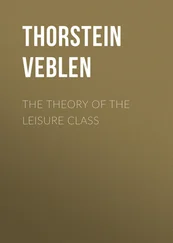So that the habits of life of the individual, and therefore of the community made up of such individuals, will pervasively and unremittingly bend this work of imputation with the set of their own current, and will accordingly involve incoming elements of knowledge in a putative system of relations consistent with these habits of life. This comprehensive scheme of habitual apprehensions and appreciations is what is called the “genius,” spirit, or character of any given culture. In all this range of habitual preconceptions touching the nature of things there prevails a degree of solidarity, of mutual support and re-enforcement among the several lines of habitual activity comprised in the current scheme of life; so that a certain characteristic tone or bias runs through the whole, - in so far as the cultural situation haaas attained that degree of maturity or assimilation that will allow it to be spoken of as a distinctive whole, standing out as a determinate and coherent phase in the life-history of the race. To this bias of scope and method in the current scheme of life, intellectual and sentimental, any new element or item must be assimilated if it is not to be rejected as alien and unreal or to fall through by neglect. All this bears on the scope and method of knowledge, and therefore on the facts made use of in the industrial arts, just as it bears on any other feature of human life that is of the nature of habit. And the immediate question is as to the bias or drift of the pecuniary culture as it affects the apprehension of facts serviceable for technological ends.
This pecuniary bias or bent may be described as invidious, personal, emulative, looking to differential values in respect of personal force or competitive success, looking to gradations in respect of comparative potency, validity, authenticity, propriety, reputability, decency. The canons of pecuniary repute preclude the well-to-do, who have leisure for such things, from inquiring narrowly into the facts of technology, since these things are beneath their dignity, conventionally distasteful; familiarity with such matters can not with propriety be avowed, nor can they without offence and humiliation be canvassed at all intimately among the better class. At the same time pecuniary competition, when carried to its ideal pitch, works the lower industrial classes to exhaustion and allows them no appreciable leisure or energy for indulging any possible curiosity of this kind on their part. The habitual (ideal) frame of mind is that of invidious self-interest on the one hand, due to the imperative and ubiquitous need of gain in wealth or in rank, and on the other hand class discrimination due to the ubiquitous prevalence of distinctions in prerogatives and authentic standing. The discipline of the pecuniary religions, or of the religious tenets and observances proper to the pecuniary culture, runs to a similar effect; more decisively so in the earlier, or distinctively predatory, phases of this culture than in the peaceable or commercial phase. The vulgar facts of industry are beneath the dignity of a feudalistic deity or of his priesthood; at the same time that the overmastering need of standing well in the graces of an all-powerful, exacting and irresponsible God throws a deeper shadow of ignobility over the material side of life, and makes any workmanlike preoccupation with industrial efficiency presumptively sinful as well as indecorous.
The pecuniary culture is not singular in this matter. Always and everywhere the acquirement of knowledge is a matter of observation guided and filled out by the imputation of qualities, relations and aptitudes to the observed phenomena. Without this putative content of active presence and potency the phenomena would lack reality; they could not be assimilated in the scheme of things human. It is only a commonplace of the logic of apperception that the substantial traits of objective facts are a figment of the brain. Under the discipline of this pecuniary phase of culture the requisite imputation of character to facts runs, as ever, in anthropomorphic terms; but it is an anthropomorphism which by habit conforms to the predatory-pecuniary scheme of preconceptions, such as the routine of life has made ready and convincing to men living under the discipline of emulation, invidious distinctions and authentic pecuniary decorum. Under these circumstances it is not in the anthropomorphism of naive workmanship that the putative reality of facts is to be sought, but in their conformity to the conventionally definitive preconceptions of invidious merit, authentic excellence, force of character, mastery, complaisance, congruity with the run of the established institutional values and the ordinances of the Most High. The canons of reality, under which sense impressions are reduced to objective fact and so become available for use, and under which, again, facts are put in practice and turned to technological account, are the same canons of invidious distinction that rule in the world of property and among men occupied with predatory and pecuniary precedence. In effect men and things come to be rated in terms of what they (putatively) are - their intrinsic character - rather than in terms of what they (empirically) will do.
Without pursuing the question farther at this point, it should be evident that the bias of the pecuniary culture must on the whole act with pervasive force so to bend men’s knowledge of the things with which they have to do as to lessen its serviceability for technological ends. The result is a deflection from matter-of-fact to matter of imputation, and the imputation is of the personal character here spoken of. The dominant note appears to be a differential rating in respect of aggressive self-assertion, whether in human or non-human agents. Theological preconceptions are commonly strong in the pecuniary culture, and under their rule this differential rating develops into a scheme of graded powers and efficacies vested in the phenomena of external nature by delegation from an overruling personal authority. Such a bent is necessarily prejudicial to workmanship, and it may seem that the ubiquitous repressive force of this metaphysics of authority and authenticity should serve the same disserviceable end for workmanship as the more genial and diffuse anthropomorphism of the lower cultures, but with more decisive effect since it runs in a more competently organised, compact and prescriptive fashion.
Where the pecuniary culture has been carried through consistently on the predatory plan, without being diverted to that commercial phase current in the latterday Western civilisation, the conclusion of the matter has been decay of the industrial arts and effectual dissipation of that system of matter-of-fact knowledge on which technological efficiency rests. In the West, where the predatory phase proper has eventually given place to a commercial phase of the same pecuniary culture, the general run of events in this bearing has been a decline of knowledge, technology and workmanship, running on so long as the predatory (coercive) rule prevailed un-broken, but followed presently by a slow recovery and advance in technological efficiency and scientific insight; somewhat in proportion as the commercialisation of this culture has gained ground, and therefore correlated also in a general way with the decline of religious fear.
This run of events may tempt to the inference that while the predatory phase proper of this pecuniary civilisation is inimical to matter-of-fact knowledge and to technological insight, the rule of commercial ideas and ideals characteristic of its subsequent peaceable phase acts to propagate these material elements of culture. But what has already appeared in the course of the inquiry into that still earlier cultural phase that went before the coercive and invidious régime of predation suggests that the case is not so simple nor so flattering to our latterday self-complacency.
Читать дальше












